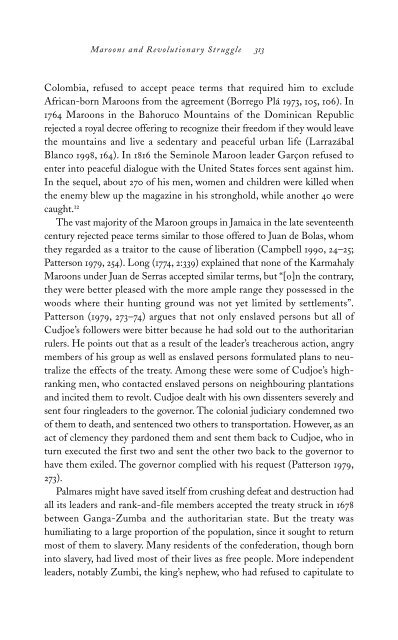60199616-flight-to-freedom-african-runaways-and-maroons-in-the-americas
60199616-flight-to-freedom-african-runaways-and-maroons-in-the-americas
60199616-flight-to-freedom-african-runaways-and-maroons-in-the-americas
You also want an ePaper? Increase the reach of your titles
YUMPU automatically turns print PDFs into web optimized ePapers that Google loves.
Maroons <strong>and</strong> Revolutionary Struggle<br />
313<br />
Colombia, refused <strong>to</strong> accept peace terms that required him <strong>to</strong> exclude<br />
African-born Maroons from <strong>the</strong> agreement (Borrego Plá 1973, 105, 106). In<br />
1764 Maroons <strong>in</strong> <strong>the</strong> Bahoruco Mounta<strong>in</strong>s of <strong>the</strong> Dom<strong>in</strong>ican Republic<br />
rejected a royal decree offer<strong>in</strong>g <strong>to</strong> recognize <strong>the</strong>ir <strong>freedom</strong> if <strong>the</strong>y would leave<br />
<strong>the</strong> mounta<strong>in</strong>s <strong>and</strong> live a sedentary <strong>and</strong> peaceful urban life (Larrazábal<br />
Blanco 1998, 164). In 1816 <strong>the</strong> Sem<strong>in</strong>ole Maroon leader Garçon refused <strong>to</strong><br />
enter <strong>in</strong><strong>to</strong> peaceful dialogue with <strong>the</strong> United States forces sent aga<strong>in</strong>st him.<br />
In <strong>the</strong> sequel, about 270 of his men, women <strong>and</strong> children were killed when<br />
<strong>the</strong> enemy blew up <strong>the</strong> magaz<strong>in</strong>e <strong>in</strong> his stronghold, while ano<strong>the</strong>r 40 were<br />
caught. 12<br />
The vast majority of <strong>the</strong> Maroon groups <strong>in</strong> Jamaica <strong>in</strong> <strong>the</strong> late seventeenth<br />
century rejected peace terms similar <strong>to</strong> those offered <strong>to</strong> Juan de Bolas, whom<br />
<strong>the</strong>y regarded as a trai<strong>to</strong>r <strong>to</strong> <strong>the</strong> cause of liberation (Campbell 1990, 24–25;<br />
Patterson 1979, 254). Long (1774, 2:339) expla<strong>in</strong>ed that none of <strong>the</strong> Karmahaly<br />
Maroons under Juan de Serras accepted similar terms, but “[o]n <strong>the</strong> contrary,<br />
<strong>the</strong>y were better pleased with <strong>the</strong> more ample range <strong>the</strong>y possessed <strong>in</strong> <strong>the</strong><br />
woods where <strong>the</strong>ir hunt<strong>in</strong>g ground was not yet limited by settlements”.<br />
Patterson (1979, 273–74) argues that not only enslaved persons but all of<br />
Cudjoe’s followers were bitter because he had sold out <strong>to</strong> <strong>the</strong> authoritarian<br />
rulers. He po<strong>in</strong>ts out that as a result of <strong>the</strong> leader’s treacherous action, angry<br />
members of his group as well as enslaved persons formulated plans <strong>to</strong> neutralize<br />
<strong>the</strong> effects of <strong>the</strong> treaty. Among <strong>the</strong>se were some of Cudjoe’s highrank<strong>in</strong>g<br />
men, who contacted enslaved persons on neighbour<strong>in</strong>g plantations<br />
<strong>and</strong> <strong>in</strong>cited <strong>the</strong>m <strong>to</strong> revolt. Cudjoe dealt with his own dissenters severely <strong>and</strong><br />
sent four r<strong>in</strong>gleaders <strong>to</strong> <strong>the</strong> governor. The colonial judiciary condemned two<br />
of <strong>the</strong>m <strong>to</strong> death, <strong>and</strong> sentenced two o<strong>the</strong>rs <strong>to</strong> transportation. However, as an<br />
act of clemency <strong>the</strong>y pardoned <strong>the</strong>m <strong>and</strong> sent <strong>the</strong>m back <strong>to</strong> Cudjoe, who <strong>in</strong><br />
turn executed <strong>the</strong> first two <strong>and</strong> sent <strong>the</strong> o<strong>the</strong>r two back <strong>to</strong> <strong>the</strong> governor <strong>to</strong><br />
have <strong>the</strong>m exiled. The governor complied with his request (Patterson 1979,<br />
273).<br />
Palmares might have saved itself from crush<strong>in</strong>g defeat <strong>and</strong> destruction had<br />
all its leaders <strong>and</strong> rank-<strong>and</strong>-file members accepted <strong>the</strong> treaty struck <strong>in</strong> 1678<br />
between Ganga-Zumba <strong>and</strong> <strong>the</strong> authoritarian state. But <strong>the</strong> treaty was<br />
humiliat<strong>in</strong>g <strong>to</strong> a large proportion of <strong>the</strong> population, s<strong>in</strong>ce it sought <strong>to</strong> return<br />
most of <strong>the</strong>m <strong>to</strong> slavery. Many residents of <strong>the</strong> confederation, though born<br />
<strong>in</strong><strong>to</strong> slavery, had lived most of <strong>the</strong>ir lives as free people. More <strong>in</strong>dependent<br />
leaders, notably Zumbi, <strong>the</strong> k<strong>in</strong>g’s nephew, who had refused <strong>to</strong> capitulate <strong>to</strong>


